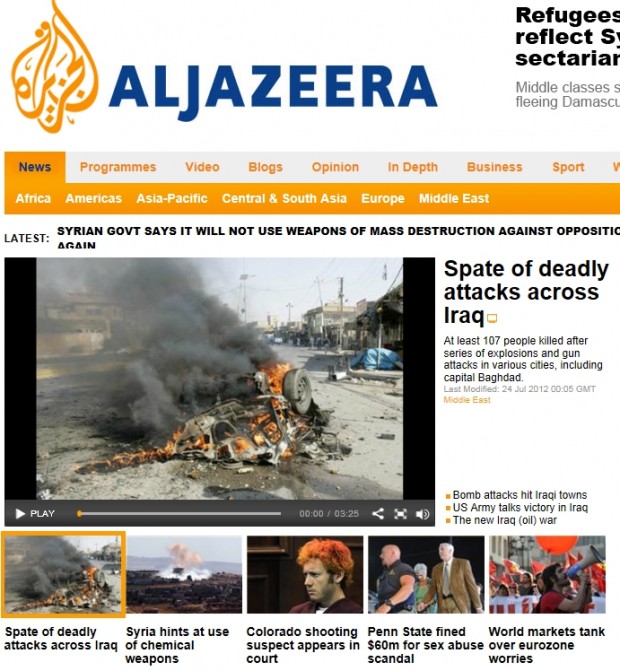Syria: Syria hints at use of chemical weapons
Top News in <Aljazeera>: Syria hints at use of chemical weapons
Syria has said it will not use chemical and biological weapons against Syrians but would use them against foreign “aggression”.
At a news conference in Damascus on Monday, foreign ministry spokesman Jihad Makdissi said that Syria was in “self defence” mode but ruled out use of the weapons even against rebels fighting President Bashar al-Assad’s regime.
“Any stocks of WMD or any unconventional weapons that the Syrian Arab Republic possesses would never, would never be used against civilians or against the Syrian people during this crisis at any circumstances, no matter how the crisis would evolve, no matter how,” Makdissi said.
Debate on Syria’s chemical weapons and whether it could use them in the ongoing military campaign to crush the rebellion started after a daring rebel attack that killed four members of Assad’s inner circle, including the defence minister and his deputy.
Syria had never publicly come out to talk about its chemical weapons, although it is widely believed to have them.
Makdissi stressed later in an email that Syria would “never use chemical and biological weapons during the crisis… and that such weapons, if they exist, it is natural for them to be stored and secured”, the AFP news agency reported.
‘Imminent threats’
Al Jazeera’s Rula Amin, reporting from Beirut, capital of neighbouring Lebanon, said there were “more immediate [and] imminent threats” for Syrians to worry about than chemical weapons.
“People on the ground are very anxious from everyday shelling and [the] crackdown. They don’t even have time to think about chemical weapons,” she said.
She added that for many Syrians, finding a safe place to live with their families was a bigger concern.
In-depth coverage of escalating violence across Syria
Makdissi’s comments drew swift international reaction, with Barack Obama, the US president, warning that Assad would be held “accountable if he made the tragic mistake” of using the weapons.
George Little, the Pentagon press secretary, told reporters: “They should not think one iota about using chemical weapons.”
In Belgrade, Serbia, Ban Ki-moon, the UN secretary-general, expressed concern about the risk of Syria using the weapons.
“It would be incomprehensible if anyone in Syria would use weapons of mass destruction,” Ban told reporters during a visit to Serbia.
European Union foreign ministers also weighed in, branding Syria’s threat as “monstrous” and “unacceptable”.
“Threatening to use chemical weapons is monstrous,” Guido Westerwelle, the German foreign minister, said in a statement.
His British counterpart, William Hague, said: “It is unacceptable to say they would use chemical weapons under any circumstances.”
‘Contempt for life’
In a statement issued after talks, the bloc’s 27 foreign ministers said: “The EU is seriously concerned about the potential use of chemical weapons in Syria.”
Syrian troops have been battling rebels in the main cities of Damascus and Aleppo in the escalating conflict that activists say has killed at least 14,000 people since March 2011.
“The Syrian regime has once again revealed the contempt for human life in its thinking,” added Westerwelle.
“I urge all authorities in Syria to responsibly contribute to securing any chemical weapons stockpiles.”
Britain’s foreign secretary Hague dismissed Syria’s claims that it was facing external aggression.
“What is actually happening is their own people are rising up against a brutal police state,” said Hague. “It has nothing to do with any aggression from anywhere else in the world … The sooner it comes to an end, the better.”
Britain has been outspokenly critical of Assad’s excessive use of force to put down the rebellion and was instrumental in drafting a Security Council resolution threatening tougher action against the regime, but was vetoed by China and Russia last week.
Catherine Ashton, the EU foreign policy chief who chaired the ministers’ talks, said the existence of chemical weapons in any area of conflict was “cause of concern”.
France’s foreign minister, Laurent Fabius, said his country was keeping a close eye on such weapons.
“These installations are the object of very particular surveillance,” he said.

























































